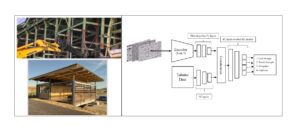The project at a glance
-
Start date:01 Feb 2024
-
Duration in months:48
-
Funding:ArcelorMittal
-
Principal Investigator(s):Christoph ODENBREIT
About
Given the significant environmental impact associated with the structural steel manufacturing process and its contribution to global warming, there is a growing concern to mitigate these effects through various means. A particularly promising approach is the reuse of structural steel elements from older buildings. However, determining the suitability of reclaimed steel for reuse is essential, especially in instances where documentation for the reclaimed steel is unavailable. To certify the properties of reclaimed steels, a series of destructive tests are required to evaluate the mechanical properties. These tests are time-consuming and costly due to their inherently destructive nature. Consequently, the primary objective of this research project is to investigate the feasibility of employing a series of non-destructive and destructive tests to accurately determine the mechanical properties of reclaimed steel, and, subsequently, the steel grades. To achieve this, an extensive number of structural steel samples from various grades will be subjected to two destructive and non-destructive testing. Destructive tests, including tensile and Charpy notch tests, will be conducted to establish the targets (labels) for the AI models. Non-destructive tests, like hardness measurements, chemical composition spectroscopy, and optical microscopy of microstructure, will be performed to provide input data for the AI models. Ultimately, a multimodal AI model will be deployed to establish a precise correlation between the input data (non-destructive test results) and the targets (destructive test results). Eventually, the applicability of the developed AI tool will be validated through its application to real-world scenarios on existing sites.
Organisation and Partners
- ArcelorMittal Chair of Steel Construction (AMC)
- Department of Engineering
- Faculty of Science, Technology and Medicine (FSTM)
Project team
-
Christoph ODENBREIT
-
Esmaeel AHMADZADE
